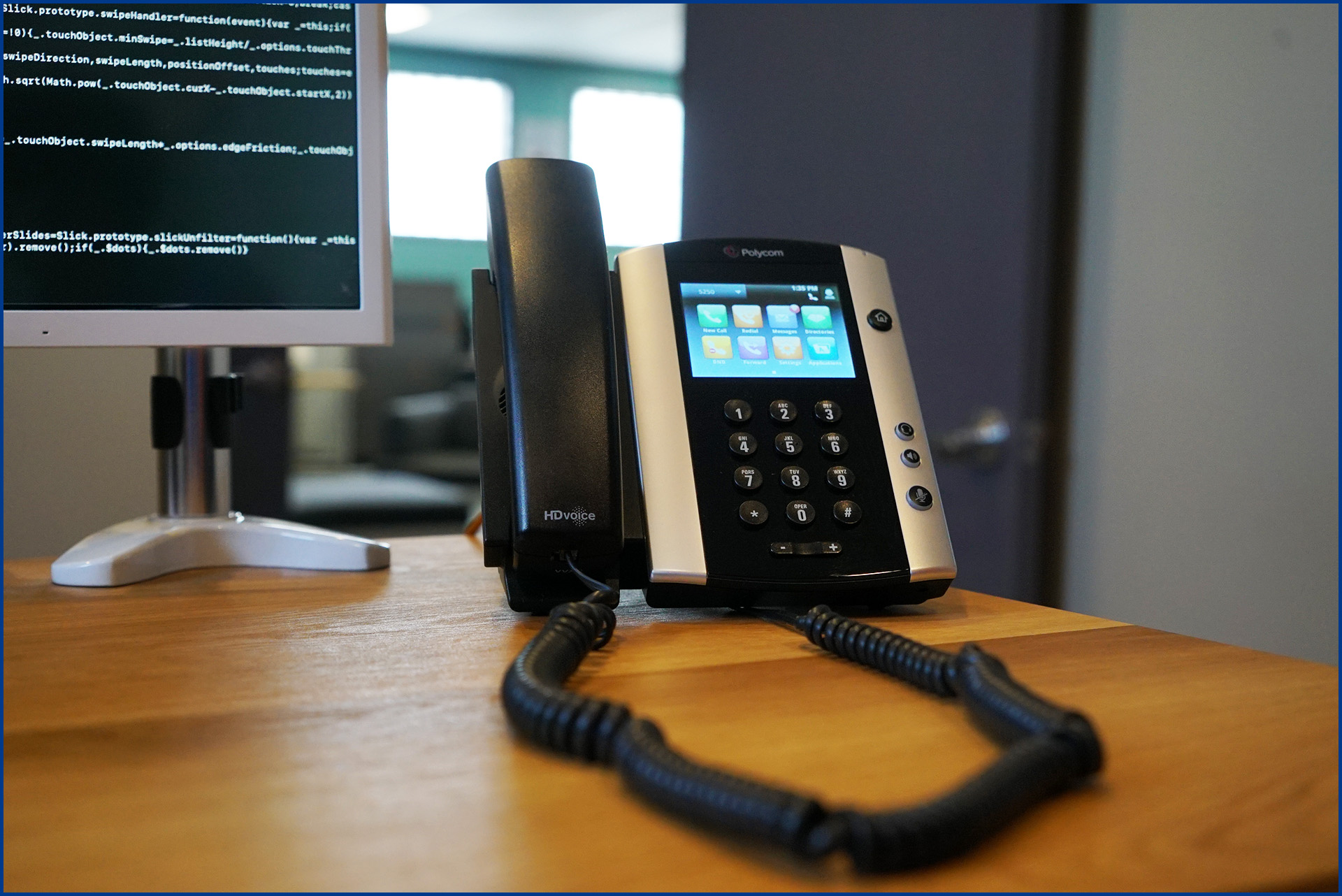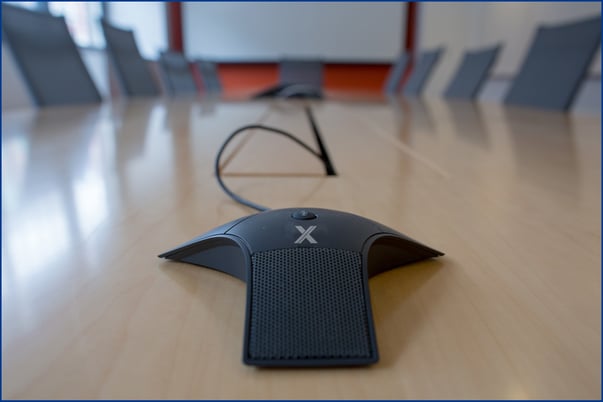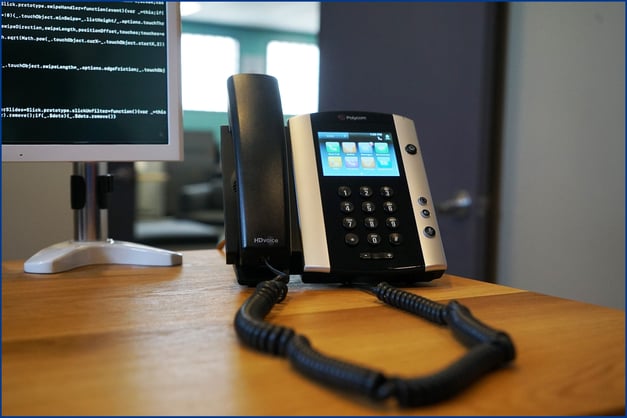VoIP Phones: How They Work and What They Are
For any organization, communication is key. Whether it’s between internal users (employees) or employees and customers, being able to communicate...

What is VoIP? VoIP is a basic acronym that stands for the phrase "voice over internet protocol." Phones that feature VoIP capabilities serve as specialized communication tools that use a broadband internet connection in place of more traditional phone systems. They have become a key component for many modern businesses over the past several years due to the extensive range of benefits that they provide users. Phones with these capabilities are classified as either hard or soft phones. Hard VoIP phones look like traditional landline phones, while soft VoIP phones are virtual phones that run through an app downloaded onto a computer or mobile device.
Related: VoIP Phones: What to know about VoIP Phones
Simply put, VoIP systems convert a user's voice signals into digital signals that can then be transferred to another party over a broadband internet connection. Suppose the user of a VoIP phone is trying to reach a standard phone number. In that case, the signal of the call will be automatically converted into a telephone signal before it reaches the end-user. Many people choose to sign up for a VoIP service because it allows them to make phone calls without signing up for traditional telephone services. VoIP allows users to make calls directly from their computer, specialized VoIP phones, or regular phones with access to a special adaptor. So long as users have access to a strong internet connection (which includes a modem and router), they should be able to sign up for and use a VoIP service. VoIP tends to be favored over traditional phones because they offer a much more extensive range of features and services.

A VoIP number (also commonly known as a virtual number) is a phone number assigned to a person when they sign up for a particular VoIP service. Like regular phone numbers, VoIP numbers are just a string of digits that users enter into a dial pad to make a call. However, VoIP numbers can be used from many electronic devices, including computers and tablets.
There is a wide array of popular VoIP software and technology currently available on the market, many of which include free services while others require a paid subscription to operate. The following are some of the most common examples of popular VoIP software used by both individuals and businesses as of 2022:
If you're looking for a top-quality provider of VoIP services and products to help you gain access to effective internet-based communication, please feel free to take a look at the wide range of VoIP hard phones provided by the experts at Systems X.
Are you a business manager looking to cut costs and improve performance by utilizing top-quality VoIP phones and software? Take a look at the expert services offered by Systems X today to learn about everything they can do to help you get started.

VoIP software and technology provide users with a wide range of exciting benefits and advantages compared to more traditional phones and phone services. The following are some of the most prominent advantages users should understand before signing up for a VoIP service or purchasing a VoIP phone.
One of the most noteworthy advantages of VoIP systems and technology is its ability to drastically lower people's and corporations' costs to make phone calls. You can only have so many phone lines installed at once, after all, and the costs of doing so quickly add up, especially if a business frequently makes long-distance calls as part of their everyday routine. VoIP phones and systems eliminate the need for these extra lines while also lowering the average cost per call. The only expenses they incur are the standard monthly service charges paid to an internet service provider (ISP).
Cloud-based VoIP technology and services can significantly increase communication accessibility globally by allowing people to make calls from anywhere while also offering complete portability. This has become especially important in this age of growing global connectivity and rapidly increasing remote or mobile employment rates. A significant component of this involves the virtual numbers, which will stay the same no matter where in the world you may travel, unlike with more traditional phone services.
Yet another advantage to VoIP is its high level of scalability compared to other communication methods. VoIP solutions remove the need to purchase expensive hardware or new phone lines as a business expands, as they would have to do if they used standard phones. Instead, users can quickly and easily toggle the performance of their VoIP devices to handle a range of situations, such as massive spikes in calls during the holidays or the opening of a new office branch.
Though the process of signing up for a VoIP or acquiring a VoIP-compatible technology may seem slightly tricky on the outside, the truth is that these systems are actually straightforward to purchase and install and almost as easy to configure to your individual or business-based needs. While a few more steps may be involved in this process than buying a traditional phone and signing up for a standard phone service, it's just as easy at the end of the day. Especially since so many VoIP providers offer a wide range of effective quality control services and customer support.
Yet another benefit of VoIP is that it allows small teams (or even one-person teams) to project themselves as being part of a larger, more reputable company by setting up an auto-attendant feature. However, its features also provide the ability to make massive corporations seem smaller and more approachable from a customer standpoint, such as by providing businesses with a VoIP phone number with a specific state area code to make them seem local. Specialized business VoIP providers also offer a range of robust conference calling features built right into their system, eliminating the need for a separate conference call provider.
Related: Use Workflow Automation to Improve Efficiency
The voice quality of VoIP services was once relatively poor. However, newer software advancements have ensured that VoIP voice quality is as crisp and clear as possible without any lag, latency, or dropped calls, just so long as you have access to a stable and fast internet connection with good bandwidth.
A common misconception about VoIP phones is that businesses and individuals won't be able to make calls in the event of an internet outage. However, VoIP is as flexible as it is reliable, and they allow the easy forwarding of calls to mobile phones and other devices without having to connect to the internet.
Along with replacing traditional phone calls, VoIP allows users to send images, videos, and documents while engaging in a conversation. This means that users can seamlessly multitask during meetings and client calls.
As stated previously, softphones are virtual phones that run through an app downloaded onto a computer or mobile device, such as Skype or Zoom. VoIP softphone systems are highly flexible regarding the devices they can be placed on, which provides its own additional set of benefits to VoIP users, such as freeing up desk space and enabling greater portability.
VoIP can help mitigate business security threats like fraudulent phone calls by leveraging IP technology advancements, such as encryption and identity management. Hosted VoIP providers also work actively to help ensure that a business's network is protected and won't have to be dealt with internally.
While VoIP offers individuals and businesses a massive range of advantages and benefits, they also carry a few distinct disadvantages that users should be fully aware of. For instance, general VoIP services are only as good as your internet connection stability and overall bandwidth strength. Suppose these elements aren't working right or as well as they should be. In that case, VoIP calls and other features are likely to run into a considerable amount of jitter and latency that will severely impact the quality of communication. Finally, it's essential to understand that VoIP systems provide a minimal level of location-based tracking compared to standard phone calls due to their enhanced portability and accessibility. These elements make it exceedingly difficult for third parties to pinpoint where calls are made or received. While there are few cases where anyone would need this information, it can potentially create problems for emergency services like 911, who will need to know someone's location in an emergency.
Related: Do You Need Technology Consulting?
Whether you're looking to switch to a VoIP service from a traditional phone carrier or are just looking for a superior VoIP provider, you need to take a look at the top-quality services provided by the industry experts at Systems X. They can quickly and easily get you and your business ready to go by setting up their system at your location and providing practical user training while also helping you to switch from physical to virtual communication environments seamlessly. Take a look at their range of top-quality VoIP products and services today to learn about what they can do for you.
Are you on the hunt for some top-quality VoIP phones to help make your business more efficient while cutting back on traditional phone service costs? Check out the fantastic services and products offered by Systems X today to learn about how they can help.

For any organization, communication is key. Whether it’s between internal users (employees) or employees and customers, being able to communicate...

In the current era of digital supremacy and with countless businesses and organizations entirely reliant on a vast array of online services to...

What is Cybersecurity Risk Management? Cybersecurity risk management is a specialized practice that prioritizes defensive measures for cybersecurity...